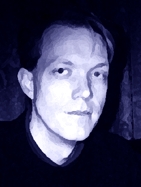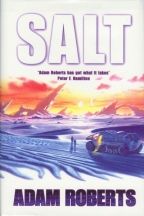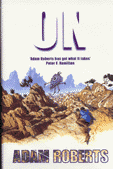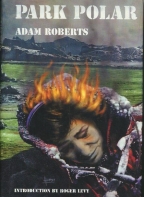 |
|
Adam Roberts is a serious young man. This is his image from the Infinity Plus Website. |
|
|
|
Special Agony Column Interview
Conducted By Rick Kleffel
August 19, 2002
Adam Roberts is the author of three science fiction novels, one work of non-fiction about science fiction and stories covering nearly all the of science fiction's sub-genres. His first novel, 'Salt' was nominated for an Arthur C. Clarke award. His follow-up novel, 'On', is based largely around the theories of Podkletnov, a controversial scientist whose work is now being developed by Boeing into a possible anti-gravity craft. 'Park Polar', a novella for PS Publishing offers a scenario not unlike that of Crichton's 'Jurassic Park', but in Roberts' vision the humans are always the scariest monsters. His latest novel, 'Stone' is a fascinating mystery set in a utopian universe where criminals are almost unknown. His novels are compulsively readable and relentlessly thought-provoking. He is the Senior Reader in English at Royal Holloway College, University of London. His fiction is anything but academic.
 |
|
Adam Roberts is a serious young man. This is his image from the Infinity Plus Website. |
TAC: Did you start writing science fiction as a result of your critical study of science fiction?
AR: I've always loved SF; read it since I was a kid. When I wanted to write, I wanted to write SF from the first. My academic career came later.
TAC: How does Adam Roberts the science fiction critic get on with Adam Roberts the science fiction writer?
AR: They have joint custody of my brain, so they are obliged to be nice to one another at least every other weekend.
TAC: You approach to science fiction seems on one level rather distant and theoretical, yet you excel at creating visual scenes. How do you reconcile the meta-fictional approach with the visceral, visual ability?
AR: Tricky question. I'm interested in good writing in the first instance, and "writing SF" (ie content, premise, theme) comes after that. It's possible that (I'm not entirely sure about this; haven't thought it properly) that my influences do divide that way.... that I engage intertextually with other SF writers when it comes to the content, and with other writers of 'mainstream literature' when it comes to the style in which I write. Some SF writers are superb stylists-Le Guin, McAuley, Gene Wolfe, Ian McDonald-but most don't invest in style and form so much as in ideas, imagination, plot and character (all of which are fine, obviously). But I am simply in awe of stylists like Nabokov, Roth, Updike, DeLillo, Lorrie Moore; Nabokov in particular is a god to me.
 |
|
Absolute thought meets unplesant individuals in 'Salt'. |
TAC: In 'Salt' you created two of the most repugnant yet compelling characters I've encountered in a science fiction novel. Are they entirely products of your imagination, or are there real life analogues to Petja the anarchist and Barlei the Christian?
AR: No specific models; but I've hung out with my fair share of Marxists and radicals in my time, and various elements got translated into the anarchists in Salt; similarly I've known plenty Christians; besides which right-wing Christianity has a very high profile in today's media. They're both absolutist individuals of course; that brand of absolute thought is very interesting to me, and nicely appropriate to science fiction I think.
 |
|
Scenes of violence may make 'On' tense reading for the sensitive. |
TAC: 'On' has some scenes that are reminiscent of recent events in Serbia. Both 'On' and 'Salt' employ characters who participate in sexual violence. Can you comment on the use of this extreme in your fiction?
AR: This is a very difficult area, isn't it. It came up at a BSFA talk when Salt was up for the Clarke Award in 2001: that year nearly all the shortlisted titles involved sexual violence of men against women-which is, it hardly needs saying, a very bad thing, something that no author should use for cheap effect. It's hard to comment on this without seeming glib, but I wonder if the negative representation of 'aggressive masculinity' that this sort of sexual violence involves is a sort of reaction to, a sort of commentary upon, the longstanding fascination SF used to have for hard, ruthless, macho caricatures. All that golden age rocket-boy stuff. Given that women have now colonised the genre, and that the best writers working today are women, the symbolic freight of 'male domination' in the genre finding a correlative in these sorts of scenes. It wasn't consciously that, not in my book anything; but that might be at the root of it, I don't know.
TAC: According to your web site, your latest science fiction novel, 'Stone' is a book in which the main character is both the perpetrator and the detective in a plot to massacre the population of a planet. Do you think that you might take your metafictional approach to other genres? Are you interested in employing your approach on a police procedural, a horror novel, or a sword and sorcery fantasy?
AR: Bingo, this is exactly what I want to do. Stone was a whodunit, but was also my Jack Vance novel (or so it seemed to me when I was writing it). Now I'm putting together a short-story collection, hopefully for Stateside publication, in which each of the tales inhabits a different SF sub-genre. And although I haven't yet got round to thinking about police procedural, horror or fantasy, I am planning and starting work on my next two novels, which I hope will be an alternate history and a Robert Heinlein style hard-sf near future thing. The sub-genres of SF give a writer so much scope, there's so much fun to be had, it seems a shame not to try them all.
TAC: What authors inspired you in your take on science fiction? Your work in some ways resembles that of Stanislaw Lem. What authors currently working are you interested in?
AR: I love Lem; he exploded with ideas, a genius. So yes, him. Who else? Plenty, plenty. I'm reading a great deal of SF at the moment for my academic job, but there are people I am particularly into, some of whom are mentioned above: Le Guin, McAuley, Wolfe, Christopher Priest. Also Jack Vance, Sheri Tepper, Gwyneth Jones, Robert Silverberg, Greg Egan, Steve Baxter. Those are some of the alive ones.
TAC: Can you take a moment to talk about the Internet? You have an extensive and well designed web site. How do you approach maintaining the site? Does the internet affect your writing style or process? You're currently working on an ezine column for Mark Chadbourn. Can you talk about the column, the ezine, and the email?
AR: The ezine (www.alienonline.co.uk) is run by Mark and by another sterling fellow called Ariel, and it's Ariel's magic that made my website look so splendiferous. He maintains it too: I send him stuff and he posts it. He is a prince among men. My own use of the web is small beer: emails, surfing etc. I did do a course in Hot Metal Pro, but that's antique now I understand, and I don't get involved in the website designing thing. The column in alienonline used to be a general SF column, and now has mutated into a 'Readings in Classic SF' space, where I post fortnightly dispatches from the front line of academic research in the field, ho ho, ahem, excuse me whilst I cough knowingly. I also review for infinityplus.
TAC: Are there plans for publication of your novels in America?
Salt and On are now distributed in the US by Gollancz, so they should be available over there. Or so I'm told.
 |
|
Peter Crowther's PS Publishing offers the joys of small-press attention to detail. |
TAC: You've just published 'Park Polar' with PS Publishing, a small press. Can you talk about your experiences in the large publishers, the small press, and potential foreign publications?
AR: PS is run by Pete Crowther, who is another excellent and wonderful example of humanity. Because Pete is such a good guy, and such a good editor, working for the press is a joy and I'll happily go on doing so until I get (a) dead or (b) unsaleable. In fact the differences between the writer's experience of the small press and the large press are really not that pronounced: it depends to such a large extent on your relationship with whoever is your contact. Since both Pete and Simon (Spanton, my editor at Gollancz) are both marvellous people, that works well. Other than that it's sending copy, revising at editorial suggestion, doing proofs etc. etc. the same with the smaller as with the larger organisation. As far as foreign publication goes, Salt is being translated into German as we speak. Otherwise my plans for world domination hold fire until other countries go for it.
TAC: What are your plans for future fiction and non-fiction?
AR: Writing a novel now (see my previous answer-but-four). The Heinleiny thing would be called 'Round and Round'; the alternate history would be called 'Swiftly'. I'm trying to decide which to devote my time to first-probably the latter. Non-fiction means writing the Palgrave Critical History of Science Fiction for, yes, Palgrave.
TAC: In both 'On' and 'Stone' you show a fascination with gravity, and use it for several clever science fiction inventions. Can you talk about your interest in gravity, and in Podkletnov's theories? Are you aware that Boeing is currently working on new products based on Podkletnov's theories? [See article.]
AR: Gravity's just one of those really fascinating things, because nobody knows how it works; the 'theories' are actually just metaphorical descriptions of gravity, not fundamental explanations (bending space time, gravitons etc.). Given that these are metaphors, it appeals to me to play around with them: If we think of gravity as an arrow, then what if the arrow pointed in a different direction to the one we're used to? If we think of a planet deforming space-time like a cannonball on a rubber sheet, then why not other deformations ... folds, creases, tears? In fact, I guess the Pulp convention of starships being fitted with 'gravity machines' to reproduce gravity on their decks is an un-thought-through version of the same idea as the Gravity Trench in STONE; the starship Enterprise pulls one g on its decks, but doesn't have earth-size mass or planet-sized inertia, doesn't pull one g a few meters outside the hull, as it ought. (It would make Trek much more interesting if these constraints were part of its artificial gravity, I'd say). All very interesting ...
I don't know nearly enough about Podkletnov, and hadn't heard that Boeing are doing something ... what, I wonder? An anti-grav jet? Anti gravity, as I understand it, would also be anti-momentum, which would make for an interesting flight experience.
TAC: You seem to have a facility with hard science fiction inventions, yet the resulting science fiction has a very different feel from what is commonly called "hard science fiction". Can you comment on where you fall in the spectrum between hard and soft?
AR: I have an arts/humanities training; I studied English and Classics, did a PhD in English, I teach literature. So I come at the business of writing primarily from the literary and aesthetic side, and I think through scientific premises or gadgets first from their thematic or metaphoric potential, and only afterwards from the point of view of consistency with the laws of physics and so on. This second part is important, or the books would be mere wish-fantasy, but it comes secondarily. A lot of hard sf is written by people trained in science, who think through the science side and then try to fictionalise it. That can work as well, but often is not as artistically well-handled, or so it seems to me.
TAC: Can you talk about Polystom -- why is going to turn our heads around backwards?
AR: Its set in a solar system in which there is atmosphere between the planets, where you can fly from earth to moon in a biplane if you so choose. Writing it made me think more about the vacuum of space, and how unlikely that is; atmosphere sitting around our world like water in a puddle. If a pressurised airplane blows out a window, the explosive depressurisation makes spectacular cinema, of course: but the pressure gradient between sea-level air pressure and total vacuum is much more pronounced, and these two things are separated, cosmically, by practically nothing. Why doesn't our atmosphere leak away? How can a tiny moon like Titan have a dense atmosphere, and a great big planet like Mars have hardly any? I know that it comes down to gravity again, escape velocity and the speed air particles move at, but the particles are very small, and therefore it takes relatively little energy to accelerate them very quickly. The more I thought about it the weirder it got: it was the conceptual equivalent of reading an ordinary word (say, 'baggage') aloud over and over until it starts to lose all meaning, until it becomes thoroughly estranged.
TAC: Any final thoughts -- plans -- comments on the "the state of the art"?
AR: Only that it seems to be a very exciting time for British Science Fiction. A new Stan Robinson or Ursula Le Guin will still get me excited of course, but so many of the books I've read lately that have seemed to me really good, and so many of the authors worth getting excited about, are British right now: Paul McAuley, Justina Robson, Al Reynolds, Jon Courtenay Grimwood, China Mieville, James Lovegrove. I feel privileged to be a part of it, if I can say that without sounding pompous.